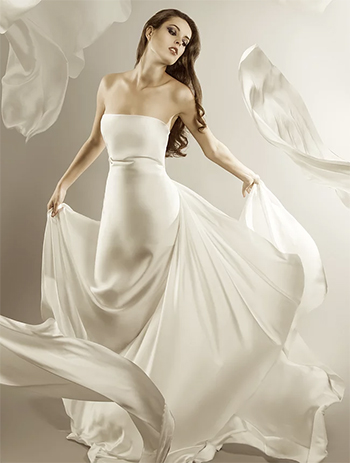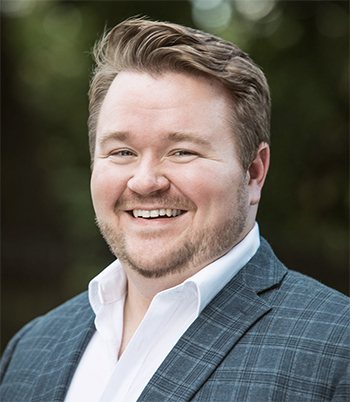by Mike Telin

Scott Skiba directs, Domenico Boyagian conducts, and the cast features Angela Mortellaro as Violetta, Benjamin Werley as Alfredo, and Grant Youngblood as Germont. The Act II party scene is always a highlight, but this one, featuring Cleveland Burlesque, promises to be a show-stopper. The lights go up on Friday, April 26 at 7:00 pm and on Sunday, April 28 at 3:00 pm. Tickets are available online.
“Cleveland Burlesque performs all around Cleveland,” Skiba said during a telephone conversation, “and I reached out to them because we are setting the production in contemporary times. I was thinking, who would Flora hire to perform at her party, and I thought she would hire burlesque dancers.”
How contemporary will the production be? “Present day, though not to the point where the cast is pulling out cell phones and texting,” Skiba said. “But Verdi intended the opera to be a timeless story, so there is nothing about it that requires it to be set in any particular period. The production will still take place in Paris and the countryside.”
Regarding the stage sets, the design team is creating an industrial look with a lot of metal and wood. Skiba also noted the large piece of canvas that will serve as a backdrop. “It starts tidy and elegant, but as Violeta gradually becomes unraveled both physically and emotionally, the fabric becomes unraveled, until it finally drapes over the top of the bed, onto the floor, and off the side of the stage.”
When the opera opens, we find the famed courtesan Violetta Valéry throwing a lavish party at her Paris salon. In attendance is Gaston and his friend Alfredo, who has adored Violetta from afar. Gastone reveals to Violetta that Alfredo loves her. Alfredo soon joins them and admits that what Gastone said is true — he is in love with Violetta. Read a full synopsis here.

What is Alfredo’s relationship to his father? “I think it’s very complicated,” Werley said. “His father interferes in his life — and probably has before as well — so he rebels a little bit and is hanging around the courtesan houses in Paris. I also think that Alfredo has a little bit of his father in him, especially when he gets angry at Violetta, and makes the scene that he does at Flora’s party.”
Werley also speculates that Alfredo’s father favored his sister over him. “Alfredo was only there to — I don’t know, take up the family business, and he rebelled against that too. I wish we knew more about their family dynamics — we have no idea what happens to the Gremonts after the opera ends. This is all something we need to think about when we are playing these people onstage. Whether or not the audience knows that is what we are going for, I think it just makes them more real, more technicolor.”
Although Werley has covered the role in the past, this weekend’s performances mark his first time onstage as Alfredo. “Traviata is just a perfect opera, there’s not a wasted note. I feel really lucky to get to be a part of it again — it’s like coming back to an old friend.”
Benjamin Werley has had the privilege of attending some of the best young artist programs in the country, including the Merola Opera Program, Santa Fe Opera, Florida Grand Opera, Virginia Opera, Opera Colorado, Opera Theatre of St. Louis, and Martina Arroyo’s Prelude to Performance. How has being part of those programs helped him learn the art of character development?
“I have had the chance to be onstage and watch true masters of their craft,” he said, “and to be next to them as they are going through their process. Tamara Wilson is the first example that comes to mind. I was onstage during the entire rehearsal process with her in Un ballo in maschera when I was a young artist at Florida Grand Opera. And seeing what she was able to do with her voice alone was incredible to me. I’ve also gotten to work with all sorts of different directors. I had several opportunities like that when I was still in school, and that was invaluable as well.”
Werley said that he always liked classical music, but it wasn’t until he attended a production of Tosca while still in high school that he was bitten by the opera bug. “Greer Grimsley was Scarpia, and there was something about his voice that really grabbed me. It’s hard to describe, but I was sitting there in the Benedum Center in Pittsburgh, and although I had an instinct that my voice was suited for classical music, I wasn’t sure that I wanted to do that for a living. But like I said, Greer’s voice just grabbed me as he was singing the ‘Te Deum’ at the end of Act I, and said you could get a chance to do something like this.”
Unlike many young male singers, there was never any doubt that Werley was a tenor. “There is still a lot that is happening to my voice,” he said. “Certain changes take place over the course of your life, especially for male singers, and the lower the voice, the longer the process takes. So now I’m having the opportunity to sing some slightly bigger repertoire than I did five years ago and that is gratifying. I really connect with the music of Verdi and Puccini. Maybe someday there will be Wagner in my future, but we’ll have to see. I’m in no rush to get there.”
After his Cleveland Opera Theater performances, Werley will head to Dayton for a production of Salome. “I’ll be singing Narraboth and Second Jew, which is something I did as a young artist at Florida Grand. It’s an interesting challenge. I don’t think too many people have done both roles at the same time — there’s about five minutes to make a quick change and get back onstage for the ensemble. And this summer I will be in Central City for their production of Billy Budd. I’ll be singing Red Whiskers, and covering Captain Vere.”
Published on ClevelandClassical.com April 24, 2019.
Click here for a printable copy of this article



